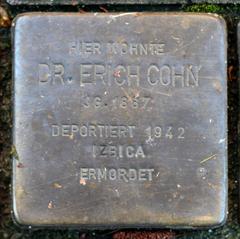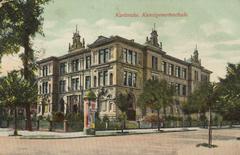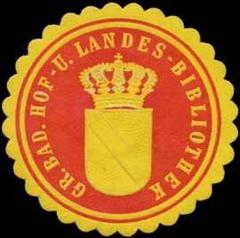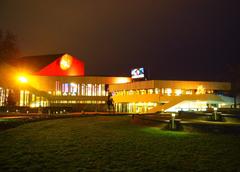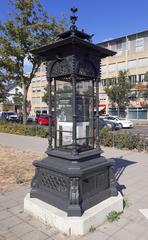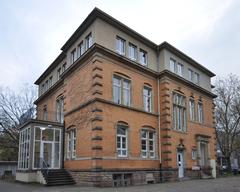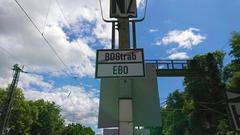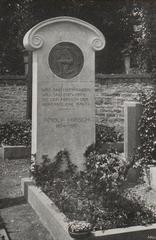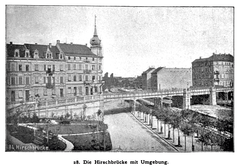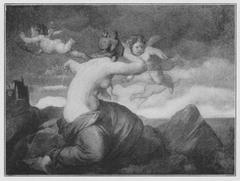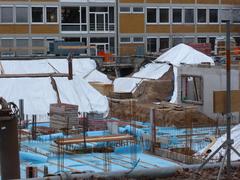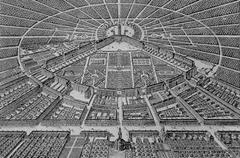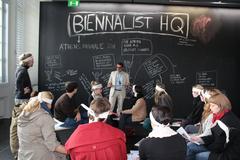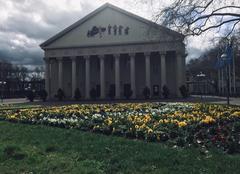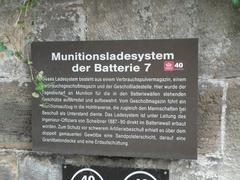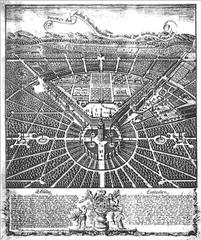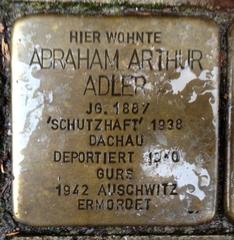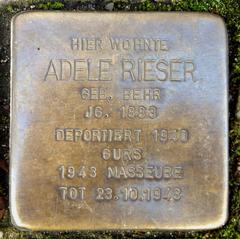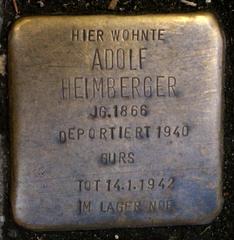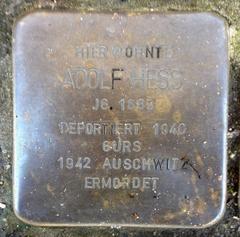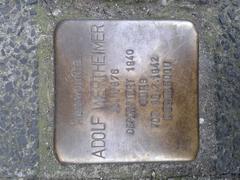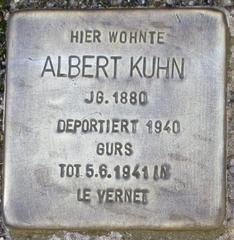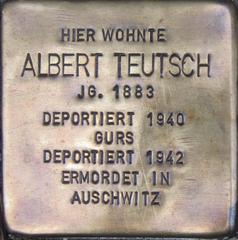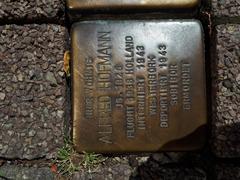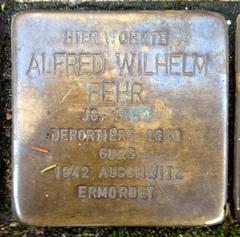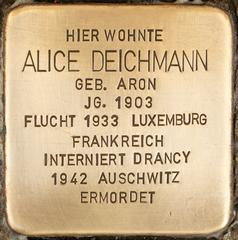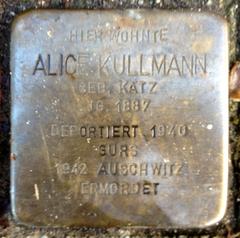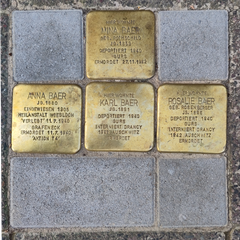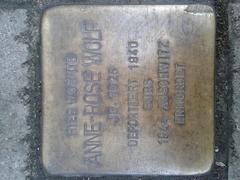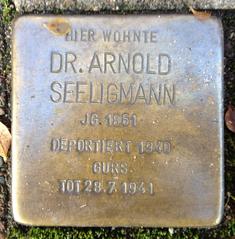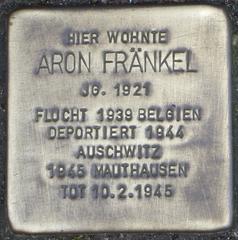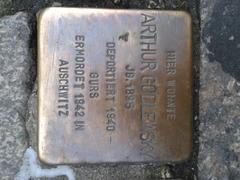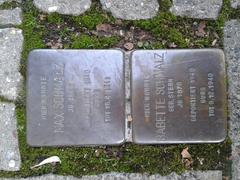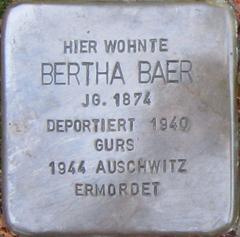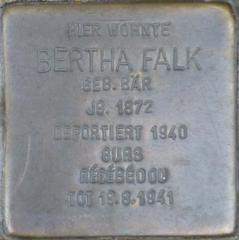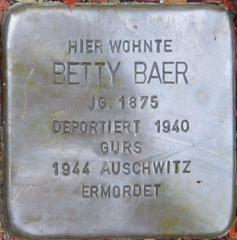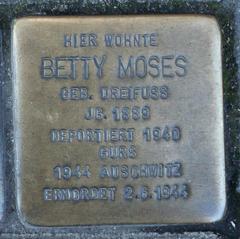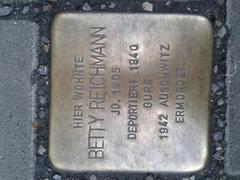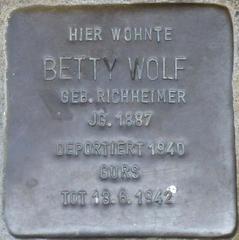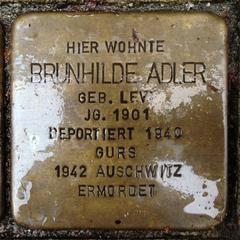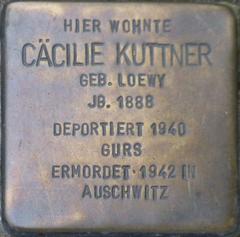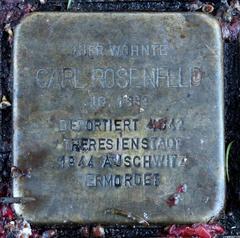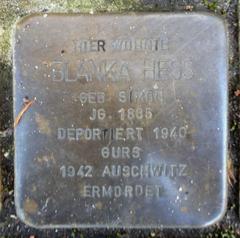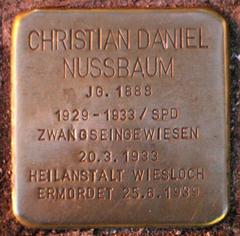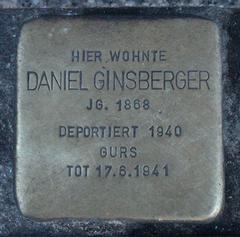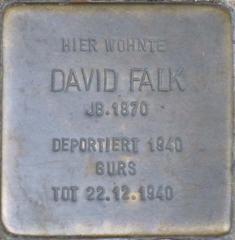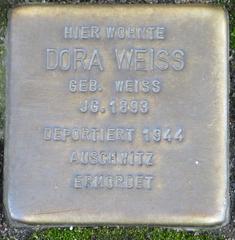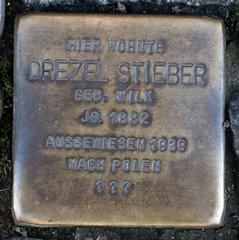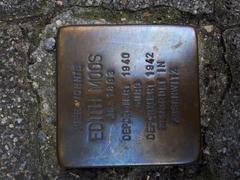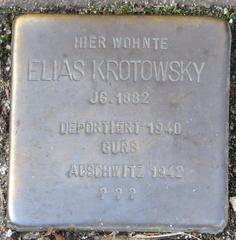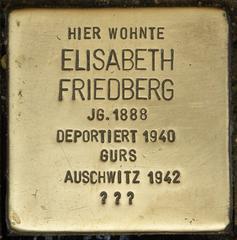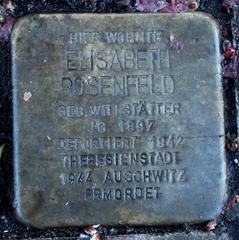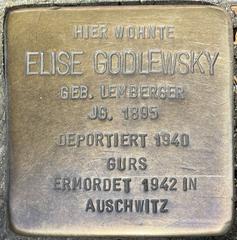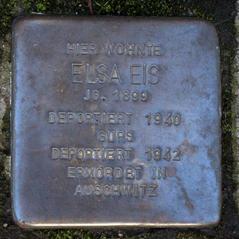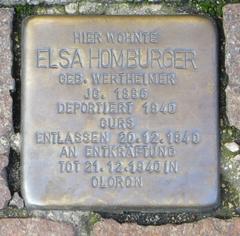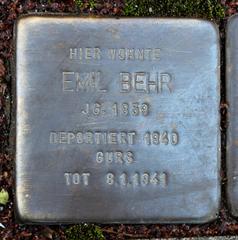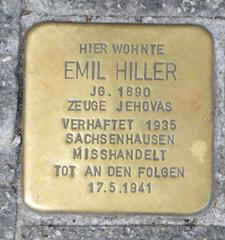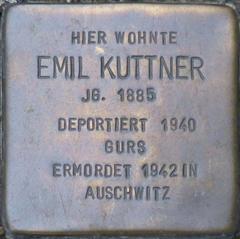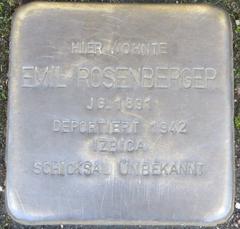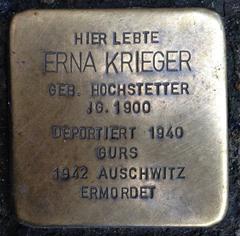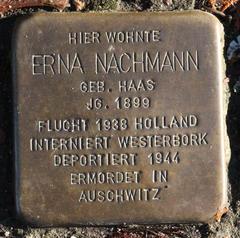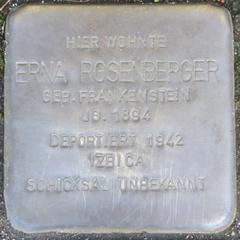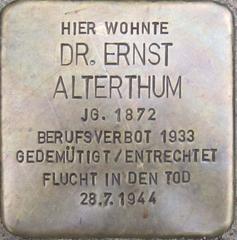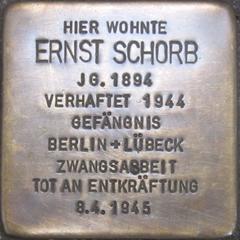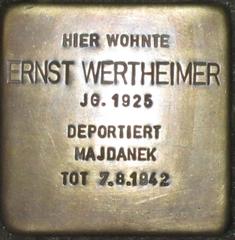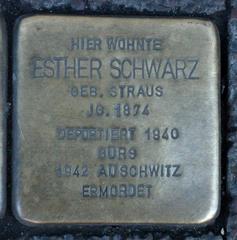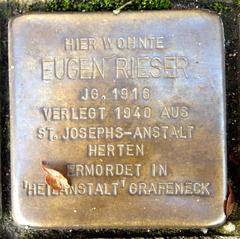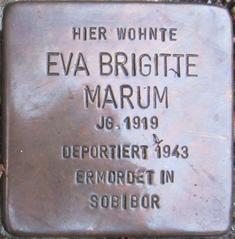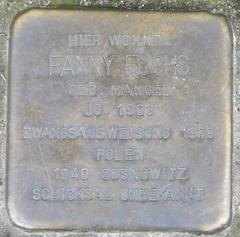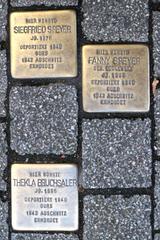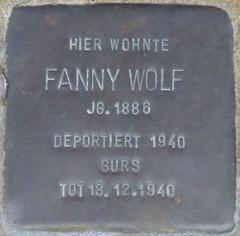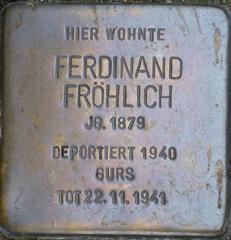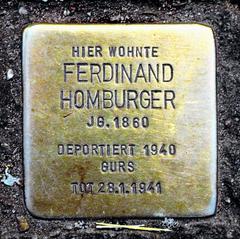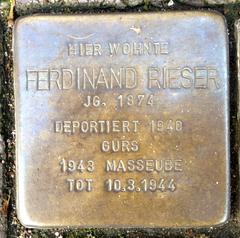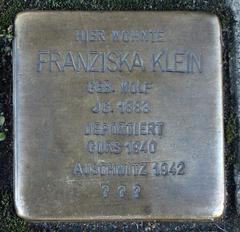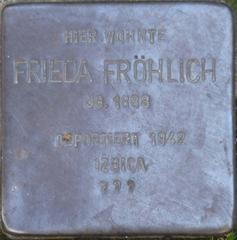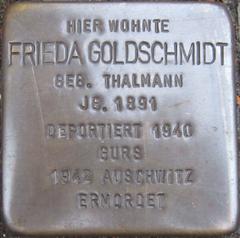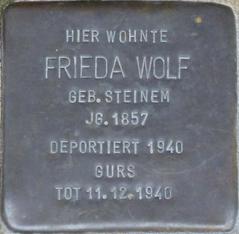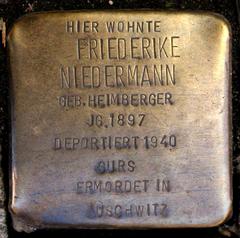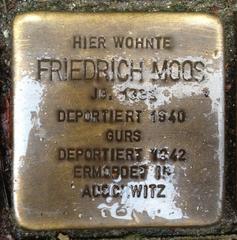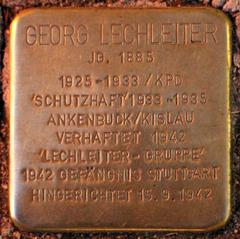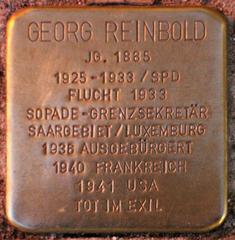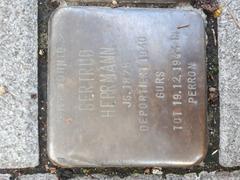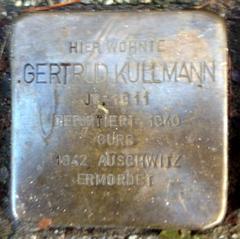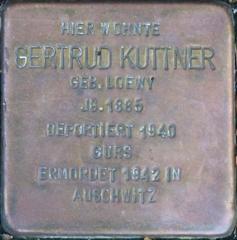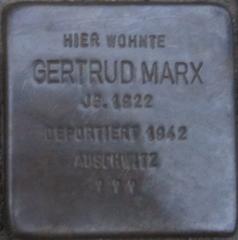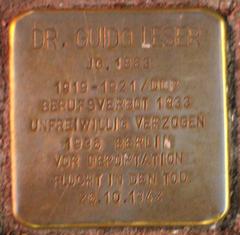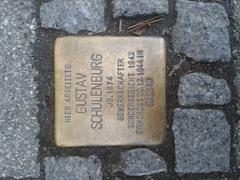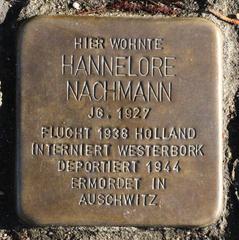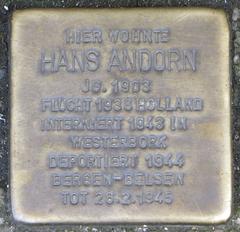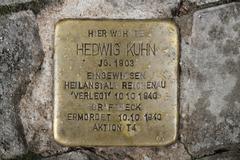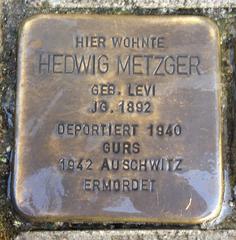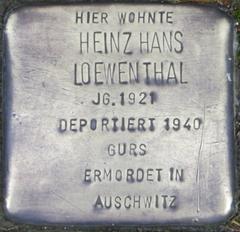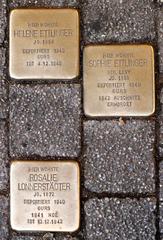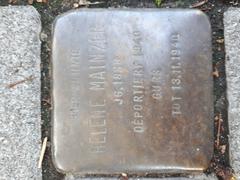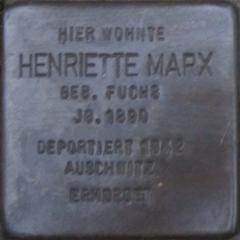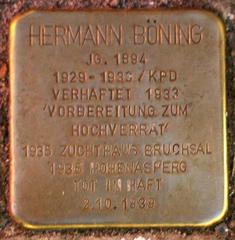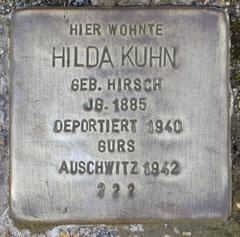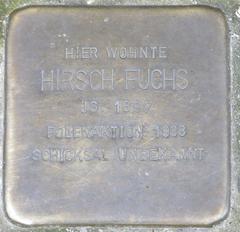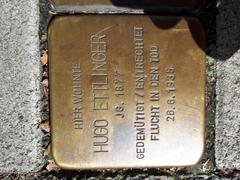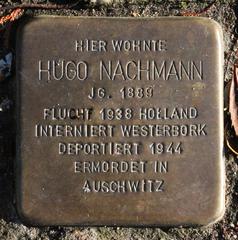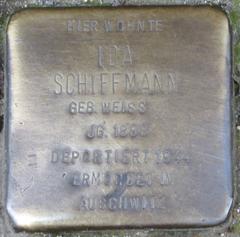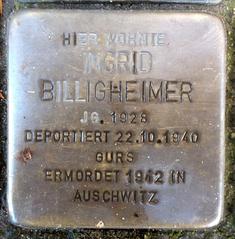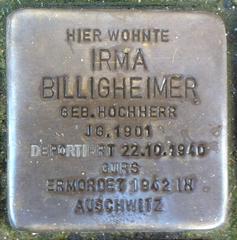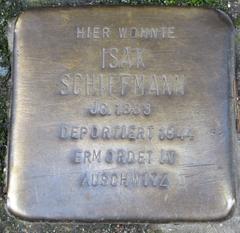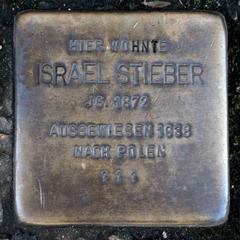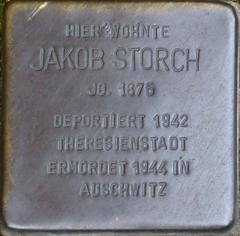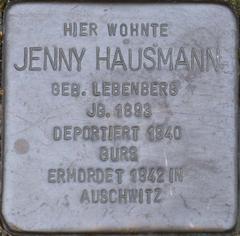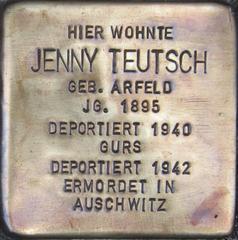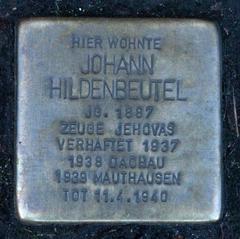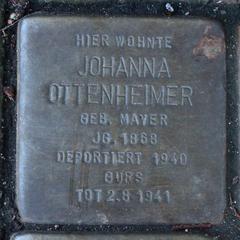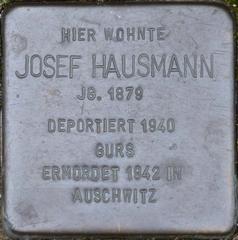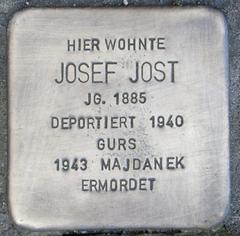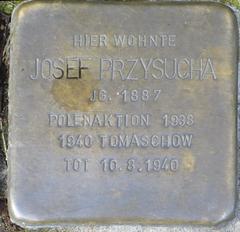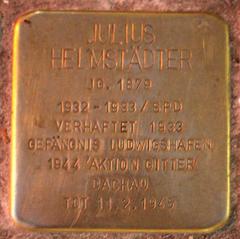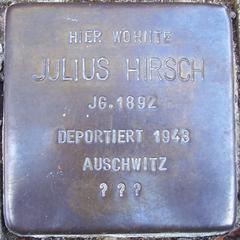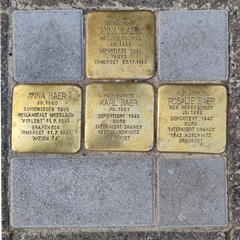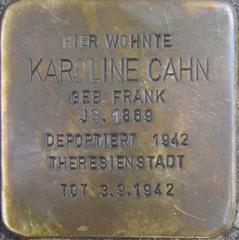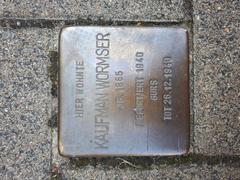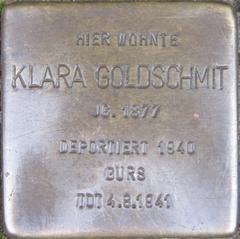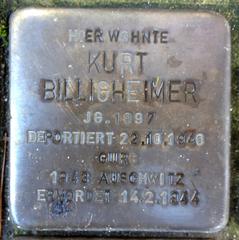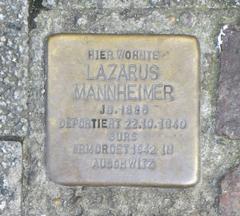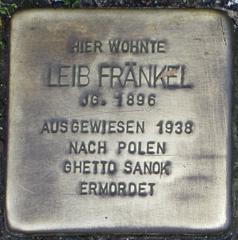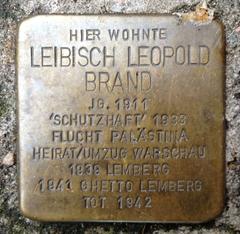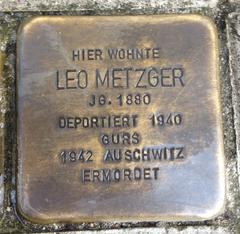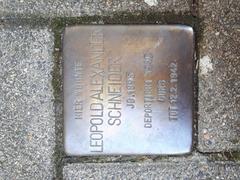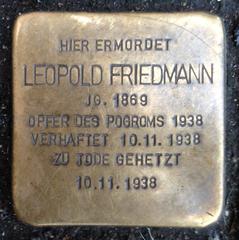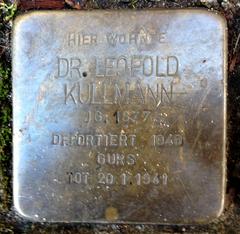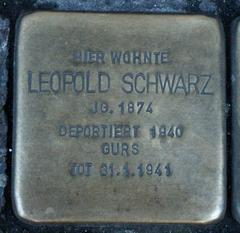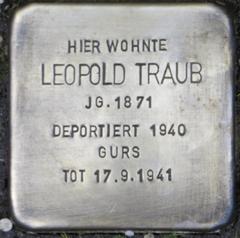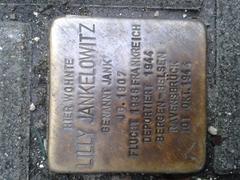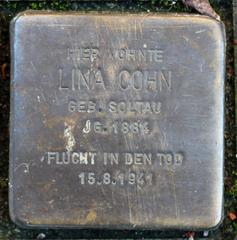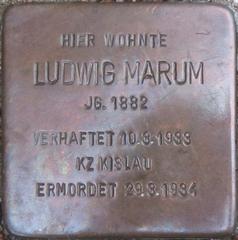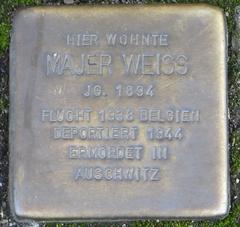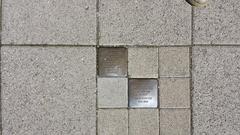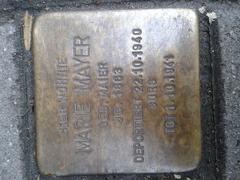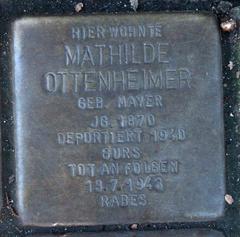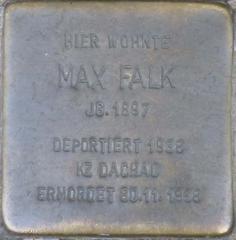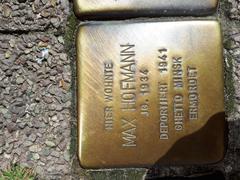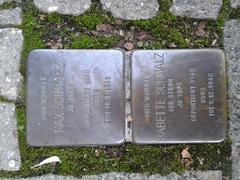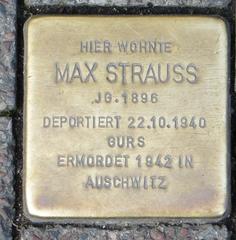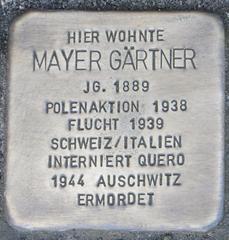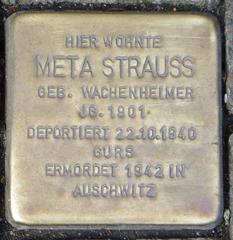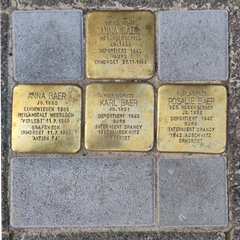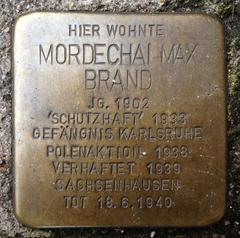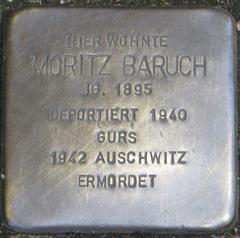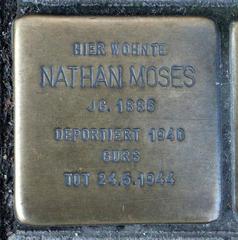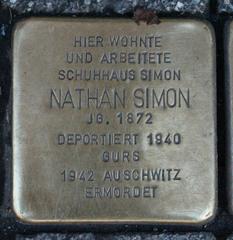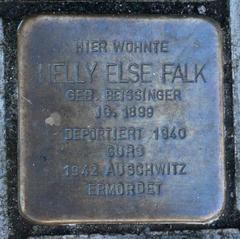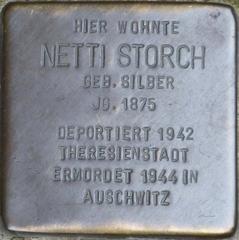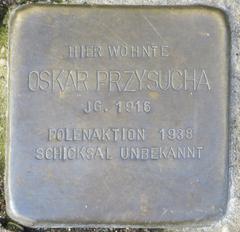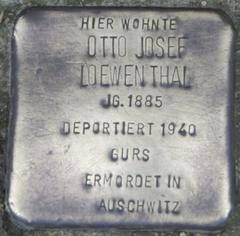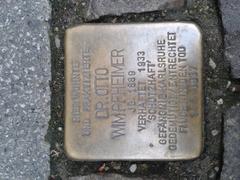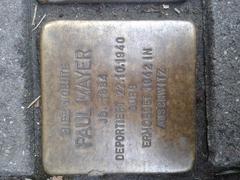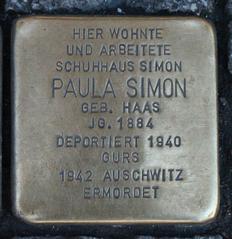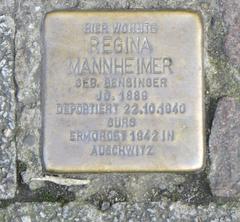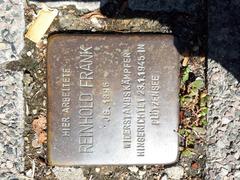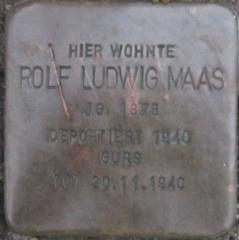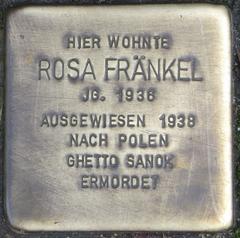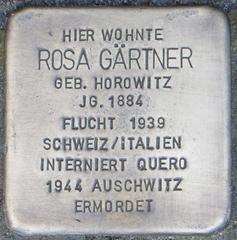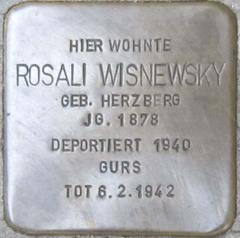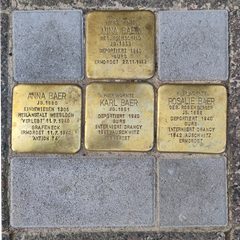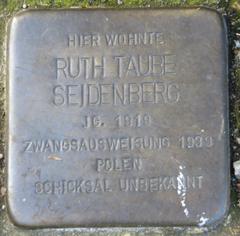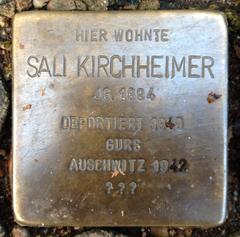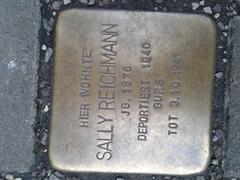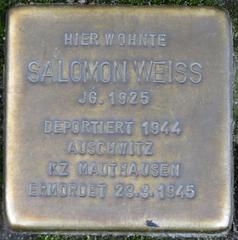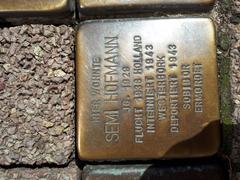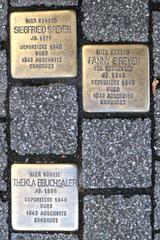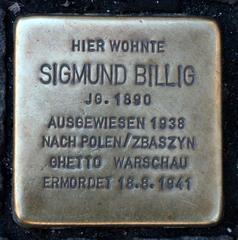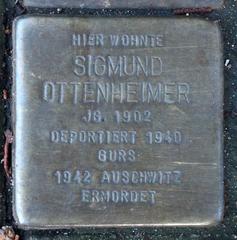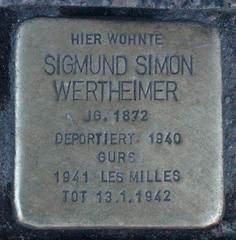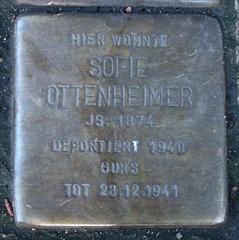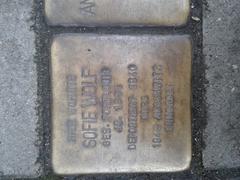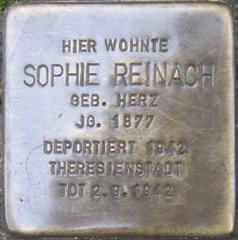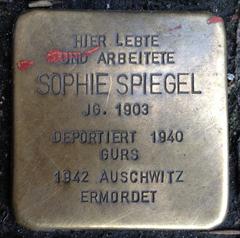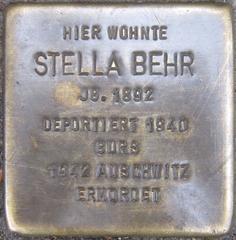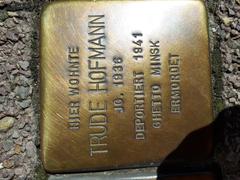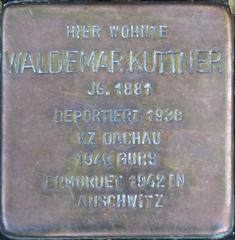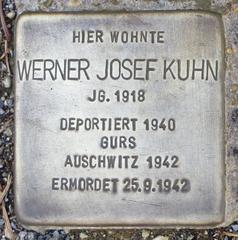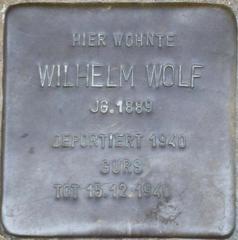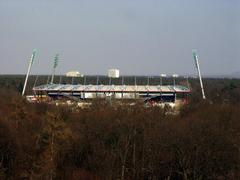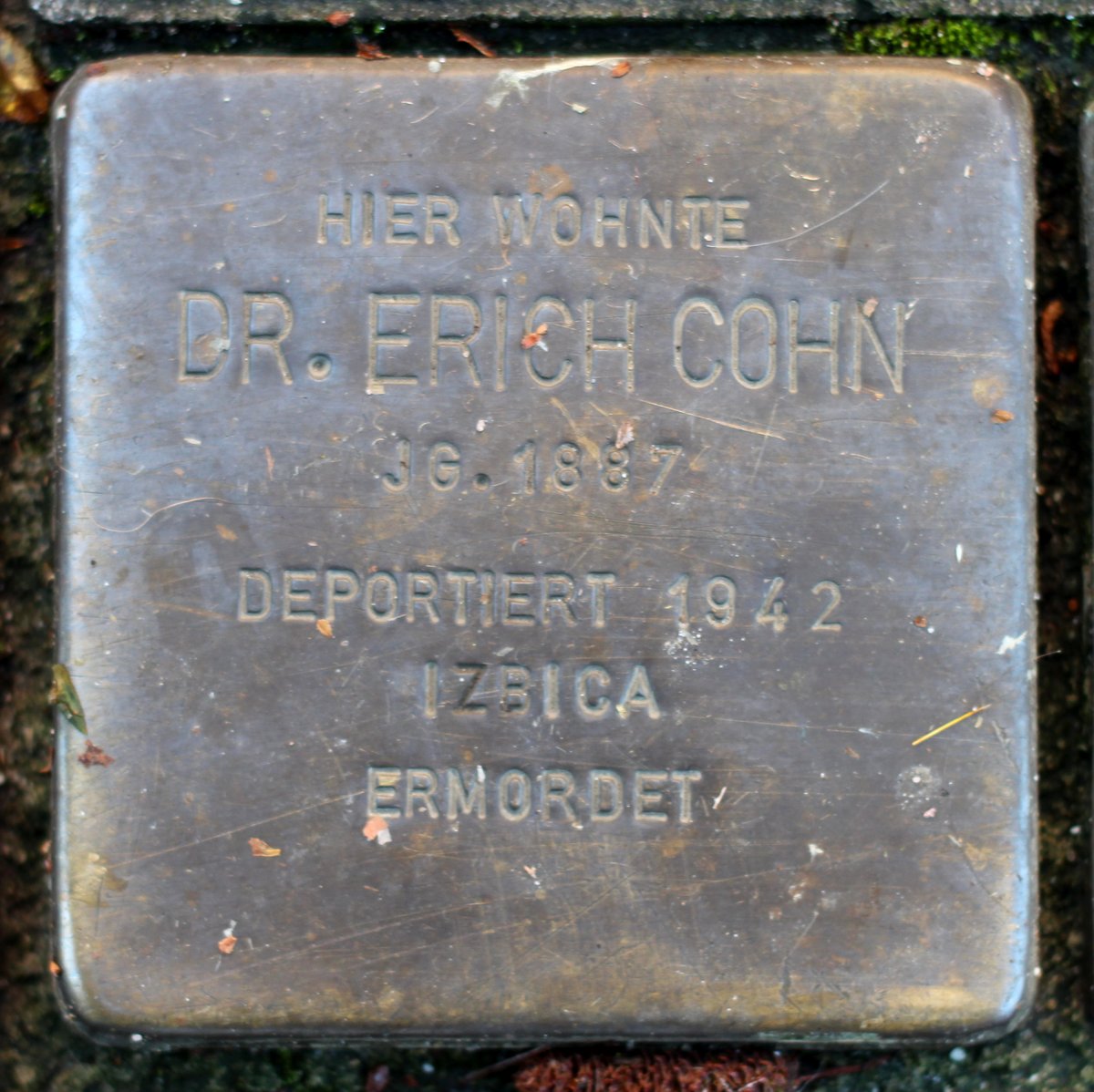
Stolperstein Erich Cohn Karlsruhe: Visiting Hours, Tickets, and Visitor Guide
Date: 14/06/2025
Introduction to the Stolperstein Dedicated to Erich Cohn in Karlsruhe
The Stolperstein for Erich Cohn in Karlsruhe, Germany, offers a profound insight into the city’s commitment to remembrance and its confrontation with the legacy of the Nazi era. Stolpersteine, or “stumbling stones,” are small brass memorials set into city sidewalks before the last freely chosen residences of individuals persecuted or murdered by the Nazi regime. Initiated by artist Gunter Demnig in the 1990s, the Stolperstein project has become the world’s largest decentralized memorial, with over 100,000 stones laid across Europe. Karlsruhe itself hosts more than 300 Stolpersteine, each marking a unique, personal story within the wider historical narrative (stolpersteine.eu).
The Stolperstein dedicated to Erich Cohn is located at Beiertheimer Allee 28. Cohn, a Jewish bookseller and cultural figure, was emblematic of the Jewish community’s fate in Karlsruhe during the Holocaust. Unlike traditional monuments, Stolpersteine blend into the cityscape, prompting spontaneous acts of remembrance in daily life. The memorial is publicly accessible at all times, without tickets or fees, making it an open invitation for reflection and education (karlsruhe-interaktiv.de).
This guide details the historical and cultural significance of the Stolperstein for Erich Cohn, provides practical visitation information, and highlights educational and community initiatives. Whether you are a history enthusiast, educator, or visitor to Karlsruhe, this guide will help you engage deeply with the city’s living memorials (karlsruhe.de/tourismus).
Contents
- Historical and Cultural Significance
- The Stolperstein Project: Origins and Local Impact
- The Life and Fate of Erich Cohn
- Location and Directions
- Visiting Hours & Admission
- Accessibility and Transportation
- Guided Tours and Educational Programs
- Visitor Experience and Etiquette
- Nearby Historical Sites and Attractions
- Educational and Community Engagement
- Frequently Asked Questions (FAQ)
- Additional Resources and Further Reading
- Conclusion
Historical and Cultural Significance
Dr. Erich Cohn (1887–1938) was a prominent member of Karlsruhe’s Jewish community, known for his work as a bookseller and his stewardship of a central cultural hub on Kaiserstraße. The memorial at Beiertheimer Allee 28 commemorates his contributions and the devastating impact of Nazi persecution on individuals and families in Karlsruhe. By preserving personal stories, Stolpersteine transform history from abstract statistics into tangible, relatable memory (stolpersteine.eu).
The Stolperstein Project: Origins and Local Impact
The Stolperstein project, launched by Gunter Demnig, embeds the memory of Nazi victims directly into public space. Each brass-plated stone is inscribed with the name, birth date, fate, and—if known—date and place of death of the individual it commemorates. More than 100,000 stones have been installed across Europe, and since 2005, Karlsruhe has participated vigorously, with local initiatives sponsoring stones and organizing commemorative events (stadtgeschichte.karlsruhe.de).
The Life and Fate of Erich Cohn
Erich Cohn’s Stolperstein is a deeply personal reminder of his life and tragic fate. Living with his wife Lina at Beiertheimer Allee 28, Cohn was temporarily shielded from deportation by his “privileged mixed marriage.” After Lina’s suicide, Erich was left vulnerable and was ultimately deported and murdered. The placement of his Stolperstein at his former home reclaims his story for public memory, countering the erasure of the Nazi era (BNN.de).
Location and Directions
- Address: Beiertheimer Allee 28, Karlsruhe
- Public Transport: Accessible via tram lines 4 and 5 (Beiertheim stop). City parking is available nearby.
To locate the Stolperstein precisely, consult the Karlsruhe Stolperstein interactive map, which features up-to-date entries for all memorial stones in the city.
Visiting Hours & Admission
Stolpersteine are publicly accessible 24/7, with no entry fee or ticket requirement. For optimal visibility and safety, visit during daylight hours. Special events and guided tours are often held on Holocaust Remembrance Day and other commemorative dates.
Accessibility and Transportation
- Wheelchair Accessibility: The site is on a public sidewalk with smooth pathways suitable for wheelchairs and strollers. Some stones may be on uneven pavements—check the interactive map for details.
- Public Transit: Karlsruhe’s trams and buses provide convenient access (KVV website).
Guided Tours and Educational Programs
Karlsruhe offers guided Stolperstein tours and educational programs through local museums and remembrance societies. These tours provide context on the individuals commemorated and the broader history of the Nazi era. Schools often integrate Stolperstein visits into curricula, fostering research, dialogue, and civic engagement (stadtgeschichte.karlsruhe.de).
Visitor Experience and Etiquette
- Reflective Engagement: Pause, read the inscription, and consider leaving a small stone or flower in keeping with Jewish tradition.
- Photography: Discreet photography for personal use is permitted.
- Respect: The Stolperstein is located in a residential area; please be considerate of residents and do not obstruct the sidewalk.
- Community Actions: Join in regular cleaning (“Putzaktionen”) organized by local groups, where participants polish the stones and read out biographies (BNN.de).
Nearby Historical Sites and Attractions
- Karlsruhe Palace & Badisches Landesmuseum: Central landmarks of local history.
- Memorial to the Victims of National Socialism: In the city center, dedicated to those persecuted by the Nazi regime.
- Jewish Cemetery and Memorials: Near the main cemetery, with grave fields and monuments.
- Karlsruhe City Museum: Exhibitions on regional history and culture.
For nearby refreshments, cafés and restaurants are located throughout the city center.
Educational and Community Engagement
- School Programs: Many schools adopt Stolpersteine, researching the biographies and presenting their findings publicly.
- Community Events: Commemorative ceremonies, readings, and exhibitions are held throughout the year.
- Partnerships: Organizations such as Lernort Kislau and Förderverein Karlsruher Stadtgeschichte e.V. support ongoing research and programming (stolpersteine-karlsruhe.jimdofree.com).
Frequently Asked Questions (FAQ)
Q: Where is the Stolperstein for Erich Cohn located?
A: Beiertheimer Allee 28, Karlsruhe.
Q: Are there visiting hours or ticket requirements?
A: No. Stolpersteine are accessible at all times, free of charge.
Q: Is the site wheelchair accessible?
A: Yes, though some pavements may be uneven. Check the interactive map for details.
Q: Are guided tours available?
A: Yes, through local museums and historical societies.
Q: Can I take photos?
A: Yes, for personal use and with respect for the neighborhood.
Q: Can I participate in cleaning actions?
A: Yes, local groups regularly organize cleaning and remembrance events.
Additional Resources and Further Reading
- Stolpersteine Karlsruhe Interactive Map
- Official Stolperstein Project
- Karlsruhe City Remembrance Portal
- Stolpersteine Karlsruhe – Verlegungen
- Karlsruhe Tourism
- Stolpersteine for Erich and Lina Cohn
Conclusion
The Stolperstein for Erich Cohn in Karlsruhe is more than a memorial; it is an invitation to reflection, learning, and community participation. By engaging with this and other Stolpersteine, visitors become part of an ongoing act of remembrance that counters forgetting and honors the dignity of those lost to history. Use the resources provided to plan your visit, join local initiatives, and help sustain the culture of memory in Karlsruhe. Your participation keeps alive the stories of Erich Cohn and countless others, reinforcing the values of tolerance, human rights, and civic responsibility for generations to come (stolpersteine.eu).
Sources and Further Reading
